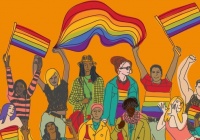Difference between revisions of "Management of LGBTQ Community Centres"
| Line 1: | Line 1: | ||
| − | [[File: | + | [[File:lgbtqcommunitycentres.jpg|200px|thumb|left]] |
Every community needs its local gathering spot and the LGBTQ community is no exception. Often called Pride Centres, many cities across the world have developed such spaces which are often located in the gay ghetto or village. These are dedicated physical spaces open to the public financed through community donations, government support, fundraising and endowed funding, and event or program income. The people and communities that centres serve are diverse, including many LGBTQ people of color, low-income people, youth, the elderly, transgender individuals, and more. Many are involved in public education and advocacy. | Every community needs its local gathering spot and the LGBTQ community is no exception. Often called Pride Centres, many cities across the world have developed such spaces which are often located in the gay ghetto or village. These are dedicated physical spaces open to the public financed through community donations, government support, fundraising and endowed funding, and event or program income. The people and communities that centres serve are diverse, including many LGBTQ people of color, low-income people, youth, the elderly, transgender individuals, and more. Many are involved in public education and advocacy. | ||
Revision as of 00:16, 17 October 2022
Every community needs its local gathering spot and the LGBTQ community is no exception. Often called Pride Centres, many cities across the world have developed such spaces which are often located in the gay ghetto or village. These are dedicated physical spaces open to the public financed through community donations, government support, fundraising and endowed funding, and event or program income. The people and communities that centres serve are diverse, including many LGBTQ people of color, low-income people, youth, the elderly, transgender individuals, and more. Many are involved in public education and advocacy.
LGBTQ community centres provide spaces for socializing, receive social services, counselling, cultural programs, recreational activities, education programs, support groups, and care and treatment. These are provided in a comfortable and safe place for individuals that are often marginalized and face discrimination. Operating an LGBTQ community centre includes budgeting, staffing, programming, fundraising, liaising with a Board of Directors, and working with city officials and other organizations. This is often the responsibility of an Executive Director.
In the United States, CentreLink is a formal organization representing and connecting LGBTQ Community Centres throughout the country. A similar organization in France is called Fédération LGBTI+.
We have identified the following individuals involved in the management of LGBTQ Community Centres around the world.
Belgium
- Suzan Daniel, Centre Culturel de Belgique
Canada
- Salah Bachir, 519 Community Centre, Toronto
- Michael Cherny, 519 Community Centre, Toronto
- Karlene Williams-Clarke, 519 Community Centre, Toronto
- Pascal Dessureault, 519 Community Centre, Toronto
- Tatiana Ferguson, 519 Community Centre, Toronto
- Michelle Douglas, 519 Community Centre, Toronto
China
- Noel Chen, Rainbow of Hong Kong, the LGBT community centre in Hong Kong
- Alex Jiang, Beijing LGBT Centre
- Fan Popo, Beijing LGBT Centre
- Xiaogang Wei, Beijing LGBT Centre
- Bin Xu, Beijing LGBT Centre
- Sam Zhao, Beijing LGBT Centre
Israel
- Elisha Alexander, Tel-Aviv LGBT Community Center
Mexico
- Paco Arjona, SETAC Gay, Lesbian Bisexual and Transgender (GLBT) Center in Puerto Vallarta, Mexico
- Ed Thomas, SETAC LGBT Community Center in Puerto Vallarta, Mexico
Mongolia
- Otgonbaatar Tsedendemberel, Mongolian LGBT Centre
Scotland
- Ian Campbell Dunn, The Edinburgh LGBT Centre
United States
- Karamo Brown, Los Angeles LGBT Center
- Colleen Carpenter, Milwaukee LGBT Community Center, Milwaukee, Wisconsin
- Masen Davis, San Francisco’s LGBT Center
- Matthew J. Dempsey, NYC LGBT Community Center
- Lester Franzen, Harriet Hancock LGBT Center, Colombus, South Carolina
- Carol Grimsby, Southern Arizona ’s Lesbian, Gay, Bisexual and Transgender (LGBT) Community Center in Tucson, Arizona
- Steven Greenberg, Jerusalem Open House, the Holy City’s LGBT community center
- Phyllis Harris, LGBT Center, Cleveland, Ohio
- Joe Hollendoner, Los Angeles LGBT Center
- Carroll M. Hunter, New York LGBT Community Services Center
- H. Gwen Marcus, New York LGBT Center
- Liz Margolies, NYC LGBT Community Center
- Ted Martin, LGBT Community Center Coalition of Central Pennsylvania
- Albert Ogle, Los Angeles Gay & Lesbian Center
- Rebecca Rolfe, San Francisco LGBT Center
- Adrian Shanker, founder and CEO of the Bradbury-Sullivan LGBT Community Center in Pennsylvania
- Jan Siegmund, New York City LGBT Community Center
- Denise Spivak, CenterLink
- Terry Stone, CenterLink
- Carmen Vazquez, New York City LGBT Community Services Center

